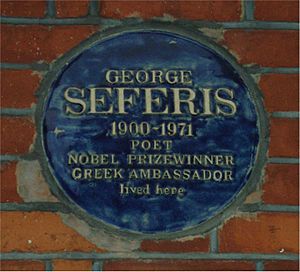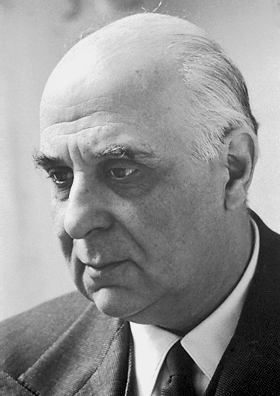Giorgos Seferis facts for kids
Quick facts for kids
Giorgos Seferis
|
|
|---|---|

Giorgos Seferis at age 21 (1921)
|
|
| Born | Georgios Seferiades February 29, 1900 Urla, Aidin Vilayet, Ottoman Empire |
| Died | September 20, 1971 (aged 71) Athens, Greece |
| Occupation | Poet, diplomat |
| Nationality | Greek |
| Alma mater | University of Paris |
| Literary movement | Modernism, Generation of the '30s |
| Notable awards | Nobel Prize in Literature 1963 |
| Signature | |
 |
|
Giorgos Seferis (born Georgios Seferiades, March 13, 1900 – September 20, 1971) was a famous Greek poet and diplomat. He is known as one of the most important Greek poets of the 20th century. He even won a Nobel Prize! Seferis worked as a diplomat for Greece, serving in many countries. His most important role was as Ambassador to the United Kingdom from 1957 to 1962.
Contents
Biography
Seferis was born in a town called Vourla, near Smyrna (now İzmir, Turkey). His father, Stelios Seferiadis, was a lawyer and a professor. He was also a poet and translator. Seferis's father believed in using the common, everyday Greek language (called demotic) instead of the more formal one. This idea influenced young Giorgos a lot.
In 1914, his family moved to Athens, the capital of Greece. Seferis finished school there. From 1918 to 1925, he studied law in Paris, France, at the Sorbonne. While he was studying, a big change happened in his home region. In 1922, the Turkish Army took over Smyrna. Many Greeks, including Seferis's family, had to leave their homes in Asia Minor. Seferis didn't visit Smyrna again until 1950. This feeling of being an exile, or someone forced to leave their home, greatly affected his poetry. It made him interested in stories like that of Odysseus, a hero who traveled far from home. Seferis was also inspired by other famous poets like Kavafis, T. S. Eliot, and Ezra Pound.
After finishing his studies, Seferis returned to Athens in 1925. The next year, he joined the Greek Ministry of Foreign Affairs. This was the start of his long and successful career as a diplomat. He worked in England from 1931 to 1934 and in Albania from 1936 to 1938.
On April 10, 1941, just before Germany invaded Greece, he married Maria Zannou, also known as 'Maro'. During World War II, Seferis traveled with the Greek government that was in exile (living outside the country). They went to Crete, Egypt, South Africa, and Italy. He returned to Athens in 1944 after it was freed.
He continued his diplomatic work, serving in Ankara, Turkey from 1948 to 1950 and in London from 1951 to 1953. He then became a minister (a high-ranking diplomat) to Lebanon, Syria, Jordan, and Iraq from 1953 to 1956. His last job before retiring was as the Greek Ambassador to the United Kingdom, from 1957 to 1961. Seferis received many awards and honorary degrees from famous universities like Cambridge, Oxford, Thessaloniki, and Princeton.
Cyprus
Seferis first visited the island of Cyprus in November 1953. He immediately loved it! Cyprus reminded him of his childhood summer home in Urla, with its similar landscapes and mix of people and traditions. His book of poems, Imerologio Katastromatos III, was inspired by Cyprus. He wrote most of it there. This was important because he hadn't written any poetry for six or seven years before that. The original title of the book, Cyprus, where it was ordained for me…, showed how much he felt at home on the island.
At that time, Cyprus was part of a political disagreement between the UK, Greece, and Turkey. Over the next few years, Seferis used his diplomatic skills to try and help solve the Cyprus dispute. He put a lot of personal effort into this. He believed in "liberal and democratic" ideas, which means he supported freedom and fair government.
The Nobel Prize
In 1963, Giorgos Seferis won the Nobel Prize in Literature. This award is given to writers for their amazing work. He won "for his excellent lyrical writing, inspired by a deep feeling for the Greek world of culture." Seferis was the first Greek person to receive this prize.
In his acceptance speech, Seferis talked about his belief in humanism. This is a way of thinking that focuses on human values and concerns. He ended his speech by saying: "When on his way to Thebes Oedipus encountered the Sphinx, his answer to its riddle was: 'Man'. That simple word destroyed the monster. We have many monsters to destroy. Let us think of the answer of Oedipus." This meant that understanding what it means to be human can help us overcome big problems. Even though some people thought of Seferis as a nationalist poet, his "Hellenism" (love for Greek culture) was more about finding a common thread of human values throughout Greek history and literature.
Later life
In 1967, a strict military government, known as the Regime of the Colonels, took power in Greece. This government censored information, arrested people for their political beliefs, and used torture. After two years of this, Seferis bravely spoke out against them. On March 28, 1969, he made a statement on the BBC World Service, which was also given to all newspapers in Athens. He clearly said, "This anomaly must end."
Seferis did not live to see the end of this military government, which happened in 1974. He passed away in Athens on September 20, 1971. At his funeral, huge crowds followed his coffin through the streets of Athens. They sang Mikis Theodorakis’ song based on Seferis's poem 'Denial', which was banned at the time. Seferis had become a hero to the people for standing up against the government. He is buried at the First Cemetery of Athens.
Legacy

Seferis's house in the Pangrati area of central Athens, near the Panathenaic Stadium, is still standing today. There are also special blue plaques on two of his former homes in London, marking them as places where a famous person lived.
In 1999, there was a discussion about naming a street in İzmir, Turkey, "Yorgos Seferis Sokagi." This caused some debate because of old feelings from the Greco-Turkish War in the early 1920s.
In 2004, a music band called Sigmatropic released an album called "16 Haiku & Other Stories." This album was inspired by Seferis's work, and its lyrics came from his poems. A famous part of his poem Mythistorema was even featured in the Opening Ceremony of the 2004 Summer Olympics in Athens:
I woke with this marble head in my hands;
It exhausts my elbows and I don't know where to put it down.
It was falling into the dream as I was coming out of the dream.
So our life became one and it will be very difficult for it to separate again.
The famous author Stephen King used lines from several of Seferis's poems in his 1975 novel Salem's Lot. Also, the composer Richard Causton wrote a piece for solo flute called Sleep, which was inspired by Seferis's Mythistorema.
Works
Seferis wrote many poems and prose works. Here are some of his well-known books:
Poetry
- Strophe, 1931 (Στροφή)
- The Cistern, 1932 (Στέρνα)
- Mythical narrative, 1935 (Μυθιστόρημα)
- Book of Exercises, 1940 (Τετράδιο Γυμνασμάτων)
- Log Book I, 1940 (Ημερολόγιο Καταστρώματος Ι)
- Log Book II, 1944 (Ημερολόγιο Καταστρώματος ΙΙ)
- The Thrush, 1947 (Κίχλη)
- Log Book III, 1955 (Ημερολόγιο Καταστρώματος ΙΙΙ)
- Three Secret Poems, 1966 (Τρία Κρυφά Ποιήματα)
- Book of Exercises ΙΙ, 1976 (Τετράδιο Γυμνασμάτων II)
Prose
- Essays (Δοκιμές) 3 vols.
- Translations (Αντιγραφές) (1965)
- Days–diaries (Μέρες) (9 vols., published after his death)
- Six Nights on the Acropolis (Έξι νύχτες στην Ακρόπολη) (published after his death, 1974)
- Varnavas Kalostefanos (Βαρνάβας Καλοστέφανος) (published after his death, 2007)
English translations
- George Seferis’s ‘On a Winter Ray’ Cordite Poetry Review [Greek and English texts]
- Three Secret Poems, trans. Walter Kaiser (1969). Cambridge, MA: Harvard University Press [Greek and English texts]
- Complete Poems trans. Edmund Keeley and Philip Sherrard. (1995) London: Anvil Press Poetry. ISBN [English only]
- Collected Poems, trans. E. Keeley, P. Sherrard (1981) [Greek and English texts]
- A Poet's Journal: Days of 1945–1951 trans. Athan Anagnostopoulos. (1975) London: Harvard University Press. ISBN
- On the Greek Style: Selected Essays on Poetry and Hellenism trans. Rex Warner and Th.D. Frangopoulos. (1966) London: Bodley Head, reprinted (1982, 1992, 2000) Limni (Greece): Denise Harvey (Publisher), ISBN: 960-7120-03-5
- Poems trans. Rex Warner. (1960) London: Bodley Head; Boston and Toronto: Little, Brown and Company.
- Collected Poems trans. Manolis (Emmanuel Aligizakis). (2012) Surrey: Libros Libertad. ISBN: 978-1926763-23-1
- Six Nights on the Acropolis, trans. by Susan Matthias (2007).
Correspondence
- This Dialectic of Blood and Light, George Seferis - Philip Sherrard, An Exchange: 1946-1971, 2015 Limni (Greece): Denise Harvey (Publisher) ISBN: 978-960-7120-37-3
See also
 In Spanish: Yorgos Seferis para niños
In Spanish: Yorgos Seferis para niños
 | Calvin Brent |
 | Walter T. Bailey |
 | Martha Cassell Thompson |
 | Alberta Jeannette Cassell |


